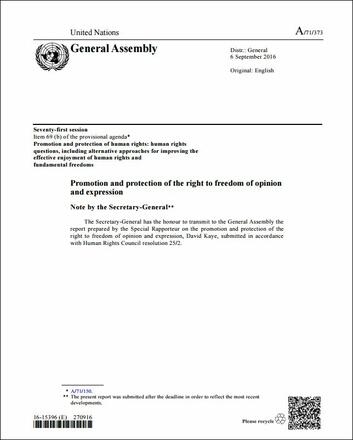
The report carries a very straightforward message for the Member States – they are failing to live up to their international freedom of expression obligations.
Presented to the UN General Assembly on the 21 October 2016, the report addresses contemporary challenges to freedom of expression. David Kaye assesses trends relating to the permissible restrictions laid out in article 19 (3) of the International Covenant on Civil and Political Rights, and concludes with recommendations that the United Nations, States and civil society may take to promote and protect freedom of opinion and expression.
The report confirms that individuals seeking to exercise their right to expression face all kinds of limitations. Some of them involve assertions of a legitimate objective, typically national security or public order, without the barest demonstration of legality or necessity and proportionality. Other limitations are based on objectives that are not legitimate under international human rights law. The targets of restrictions include journalists and bloggers, critics of government, dissenters from conventional life, provocateurs and minorities of all sorts.
The Special Rapporteur urges States to be particularly mindful of the context of digital rights, the integrity of digital communications and the roles of intermediaries, regardless of frontiers. He also encourages review and revision of national laws, cooperation with special procedures of the Human Rights Council, support or establishment of regional or sub-regional monitoring procedures and mechanisms, following the example of the Inter-American Commission on Human Rights, the African Commission on Human and People’s Rights and the Organization for Security and Cooperation in Europe which have established monitoring mechanisms on the basis of norms that are consistent with the international and regional standards.
Moreover, independent media and civic space should receive more support, at a minimum, States are encouraged to avoid imposing restrictions on reporting and research that may be seen to criticize the Government and its policies or to share information about sensitive subjects, including terrorism. Finally, state leadership should concentrate on protection of freedom of expression – Governments pursuing new policies to enhance surveillance or to limit Internet security should reconsider those efforts, as they often fail to meet the tests of necessity and proportionality.
More information can be found here .
Tags: Worldwide Freedom of expression Access to informationThe content of this article can be used according to the terms of Creative Commons: Attribution-NonCommercial 4.0 International (CC BY-NC 4.0) . To do so use the the wording "this article was originally published on the Resource Centre on Media Freedom in Europe" including a direct active link to the original article page.

